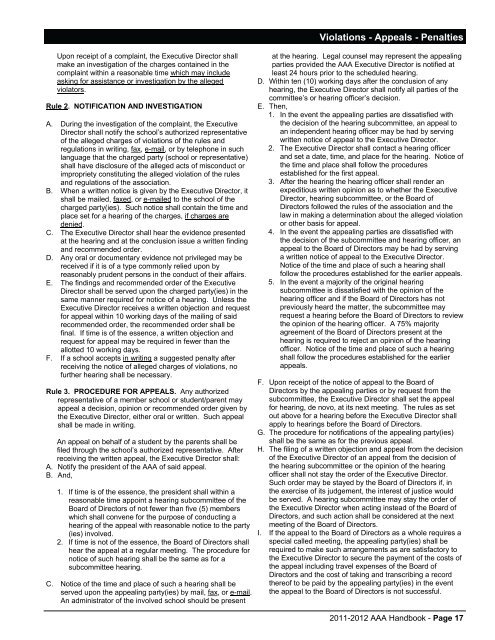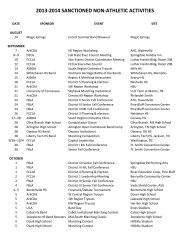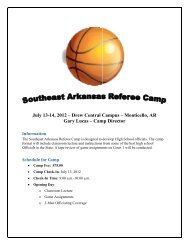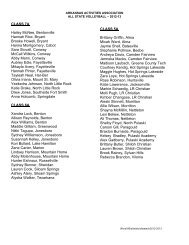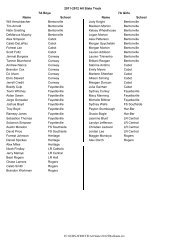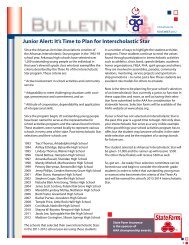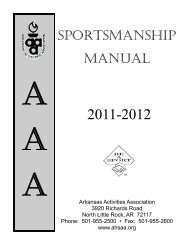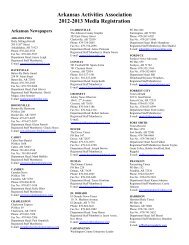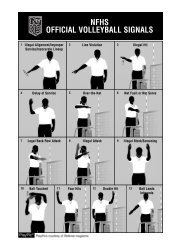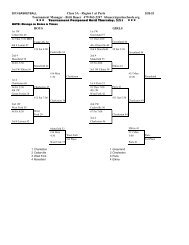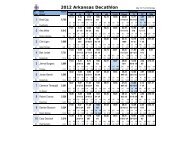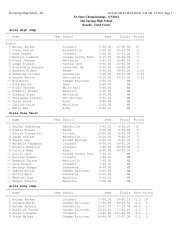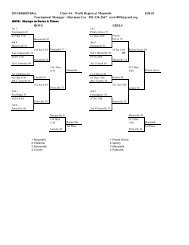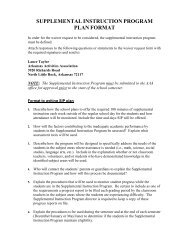2011-2012 AAA Handbook - Arkansas Activities Association
2011-2012 AAA Handbook - Arkansas Activities Association
2011-2012 AAA Handbook - Arkansas Activities Association
Create successful ePaper yourself
Turn your PDF publications into a flip-book with our unique Google optimized e-Paper software.
Upon receipt of a complaint, the Executive Director shall<br />
make an investigation of the charges contained in the<br />
complaint within a reasonable time which may include<br />
asking for assistance or investigation by the alleged<br />
violators.<br />
Rule 2. NOTIFICATION AND INVESTIGATION<br />
A. During the investigation of the complaint, the Executive<br />
Director shall notify the school’s authorized representative<br />
of the alleged charges of violations of the rules and<br />
regulations in writing, fax, e-mail, or by telephone in such<br />
language that the charged party (school or representative)<br />
shall have disclosure of the alleged acts of misconduct or<br />
impropriety constituting the alleged violation of the rules<br />
and regulations of the association.<br />
B. When a written notice is given by the Executive Director, it<br />
shall be mailed, faxed, or e-mailed to the school of the<br />
charged party(ies). Such notice shall contain the time and<br />
place set for a hearing of the charges, if charges are<br />
denied.<br />
C. The Executive Director shall hear the evidence presented<br />
at the hearing and at the conclusion issue a written finding<br />
and recommended order.<br />
D. Any oral or documentary evidence not privileged may be<br />
received if it is of a type commonly relied upon by<br />
reasonably prudent persons in the conduct of their affairs.<br />
E. The findings and recommended order of the Executive<br />
Director shall be served upon the charged party(ies) in the<br />
same manner required for notice of a hearing. Unless the<br />
Executive Director receives a written objection and request<br />
for appeal within 10 working days of the mailing of said<br />
recommended order, the recommended order shall be<br />
final. If time is of the essence, a written objection and<br />
request for appeal may be required in fewer than the<br />
allotted 10 working days.<br />
F. If a school accepts in writing a suggested penalty after<br />
receiving the notice of alleged charges of violations, no<br />
further hearing shall be necessary.<br />
Rule 3. PROCEDURE FOR APPEALS. Any authorized<br />
representative of a member school or student/parent may<br />
appeal a decision, opinion or recommended order given by<br />
the Executive Director, either oral or written. Such appeal<br />
shall be made in writing.<br />
An appeal on behalf of a student by the parents shall be<br />
filed through the school’s authorized representative. After<br />
receiving the written appeal, the Executive Director shall:<br />
A. Notify the president of the <strong>AAA</strong> of said appeal.<br />
B. And,<br />
1. If time is of the essence, the president shall within a<br />
reasonable time appoint a hearing subcommittee of the<br />
Board of Directors of not fewer than five (5) members<br />
which shall convene for the purpose of conducting a<br />
hearing of the appeal with reasonable notice to the party<br />
(ies) involved.<br />
2. If time is not of the essence, the Board of Directors shall<br />
hear the appeal at a regular meeting. The procedure for<br />
notice of such hearing shall be the same as for a<br />
subcommittee hearing.<br />
C. Notice of the time and place of such a hearing shall be<br />
served upon the appealing party(ies) by mail, fax, or e-mail.<br />
An administrator of the involved school should be present<br />
Violations - Appeals - Penalties<br />
at the hearing. Legal counsel may represent the appealing<br />
parties provided the <strong>AAA</strong> Executive Director is notified at<br />
least 24 hours prior to the scheduled hearing.<br />
D. Within ten (10) working days after the conclusion of any<br />
hearing, the Executive Director shall notify all parties of the<br />
committee’s or hearing officer’s decision.<br />
E. Then,<br />
1. In the event the appealing parties are dissatisfied with<br />
the decision of the hearing subcommittee, an appeal to<br />
an independent hearing officer may be had by serving<br />
written notice of appeal to the Executive Director.<br />
2. The Executive Director shall contact a hearing officer<br />
and set a date, time, and place for the hearing. Notice of<br />
the time and place shall follow the procedures<br />
established for the first appeal.<br />
3. After the hearing the hearing officer shall render an<br />
expeditious written opinion as to whether the Executive<br />
Director, hearing subcommittee, or the Board of<br />
Directors followed the rules of the association and the<br />
law in making a determination about the alleged violation<br />
or other basis for appeal.<br />
4. In the event the appealing parties are dissatisfied with<br />
the decision of the subcommittee and hearing officer, an<br />
appeal to the Board of Directors may be had by serving<br />
a written notice of appeal to the Executive Director.<br />
Notice of the time and place of such a hearing shall<br />
follow the procedures established for the earlier appeals.<br />
5. In the event a majority of the original hearing<br />
subcommittee is dissatisfied with the opinion of the<br />
hearing officer and if the Board of Directors has not<br />
previously heard the matter, the subcommittee may<br />
request a hearing before the Board of Directors to review<br />
the opinion of the hearing officer. A 75% majority<br />
agreement of the Board of Directors present at the<br />
hearing is required to reject an opinion of the hearing<br />
officer. Notice of the time and place of such a hearing<br />
shall follow the procedures established for the earlier<br />
appeals.<br />
F. Upon receipt of the notice of appeal to the Board of<br />
Directors by the appealing parties or by request from the<br />
subcommittee, the Executive Director shall set the appeal<br />
for hearing, de novo, at its next meeting. The rules as set<br />
out above for a hearing before the Executive Director shall<br />
apply to hearings before the Board of Directors.<br />
G. The procedure for notifications of the appealing party(ies)<br />
shall be the same as for the previous appeal.<br />
H. The filing of a written objection and appeal from the decision<br />
of the Executive Director of an appeal from the decision of<br />
the hearing subcommittee or the opinion of the hearing<br />
officer shall not stay the order of the Executive Director.<br />
Such order may be stayed by the Board of Directors if, in<br />
the exercise of its judgement, the interest of justice would<br />
be served. A hearing subcommittee may stay the order of<br />
the Executive Director when acting instead of the Board of<br />
Directors, and such action shall be considered at the next<br />
meeting of the Board of Directors.<br />
I. If the appeal to the Board of Directors as a whole requires a<br />
special called meeting, the appealing party(ies) shall be<br />
required to make such arrangements as are satisfactory to<br />
the Executive Director to secure the payment of the costs of<br />
the appeal including travel expenses of the Board of<br />
Directors and the cost of taking and transcribing a record<br />
thereof to be paid by the appealing party(ies) in the event<br />
the appeal to the Board of Directors is not successful.<br />
<strong>2011</strong>-<strong>2012</strong> <strong>AAA</strong> <strong>Handbook</strong> - Page 17


